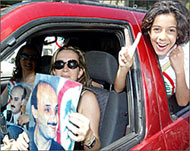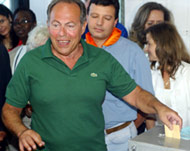Beirut clashes follow Geagea amnesty
At least one person has been killed and several others wounded in clashes that broke out in Beirut after the Lebanese parliament granted former militia leader Samir Geagea amnesty.

The violence began when sticks and rocks were used in fighting between members of the Shia Amal movement and Christian Maronite supporters of Geagea.
When gunfire broke out, Lebanese army units were deployed to the area to stop the violence. Several armed men from both sides were arrested.
Aljazeera reported that one person was killed in the clashes.
Geagea’s supporters had been celebrating following the Lebanese parliament’s decision to grant him an amnesty after 11 years in jail.
Lebanon’s parliament had also granted amnesty to nearly three dozen Muslim militants.
Geagea, the former leader of the Christian Lebanese Forces, has been linked with some of Lebanon’s most notorious civil war-era killings, including the 1987 bombing of a military helicopter that killed pro-Syrian prime minister Rashid Karami and the slaying of prominent Christian politician Danny Chamoun.
National reconciliation
Parliament voted to pardon Geagea, who has been behind bars since 1994, apparently in the spirit of national reconciliation following the withdrawal of the Syrian army and the end of Syrian domination of Lebanon.
 |
|
Geagea’s supporters celebrated |
“This national unanimity that happened today indicates the Lebanese people’s will to turn the page of the war once and for all and to head toward the future,” Geagea’s wife, Setrida, said outside parliament after the legislature’s first session since last month’s elections that swept an anti-Syrian alliance into power.
It could be a week before the former militia leader is freed, after which he is expected to travel abroad to undergo medical checkups, his wife said.
Some 100 lawmakers, including Geagea’s wife, voted for the amnesty motions, while about 15 legislators of Shia Muslim group Hizb Allah and their allies walked out when lawmakers began debating Geagea’s case.
Hizb Allah legislator Muhammad Raad said the legislators left because of the case’s political sensitivity, referring to the family of the slain Karami – including his brother and fellow former premier Omar Karami – who refuse to forgive Geagea.
Supporters celebrate
After the vote, Geagea supporters cheered outside the parliament while heavy gunfire and fireworks erupted in his northern Lebanese mountain hometown of Becharre.
 |
|
President Lahoud is expected to |
Lebanese troops stood by without intervening as other supporters in cars honked horns and waved Lebanese Forces flags.
His supporters also dismantled tents set up in Beirut’s central Martyrs’ Square, becoming the last anti-Damascus protesters to leave the square that had became the centre of popular opposition to Syrian dominance.
In Lebanon’s eastern Bekaa Valley, protesters blocked roads with rocks and burned tires because their own jailed relatives, including drug dealers, were not covered by the amnesty, according to footage aired on Lebanese television.
Amnesty law
Syrian influence over Lebanese politics stymied past attempts to secure Geagea’s pardon and the return of former foe, General Michel Aoun, from 14 years’ exile in France.
But Aoun returned on 7 May, less than two weeks after Syria withdrew its troops under US and UN pressure sparked by the 14 February assassination of former prime minister Rafiq al-Hariri.
|
“This national unanimity that happened today indicates the Lebanese people’s will to turn the page of the war once and for all and to head toward the future” Setrida Geagea, |
President Emile Lahoud has to sign both amnesties and the law must be published in the official gazette, before it is enforced. The process could take up to a week. Lahoud is expected to sign the amnesty bill.
The Muslim militants who were pardoned include 26 being tried on charges of involvement in clashes with soldiers in northern Lebanon that killed more than 40 people, including 11 troops, in 1999.
Seven other Muslim militants detained in September for plotting to bomb the Italian and Ukrainian embassies in Beirut, assassinate Western diplomats and attack Lebanese security facilities, were also pardoned.
Notorious leader
Geagea led the Lebanese Forces militia during the 1975-90 civil war and has spent most of the past 11 years in solitary confinement in an underground cell at the Defence Ministry.
He was arrested in 1994 and his group outlawed after a church bombing killed 10 people. He was later acquitted of the bombing but sentenced to three life terms on several other murder counts.
Druze, Muslim and Palestinian forces were all targeted by Geagea, who allied his men with the Israelis in the central mountain region during Israel’s 1982 invasion of Lebanon.
Other attacks that Geagea has been linked to include the 1978 attack against fellow Christians in northern Lebanon that killed the son of former president Suleiman Franjieh; the 1986 military offensive that defeated his Lebanese Forces rival commander, Elie Hobeika; and the devastating 1990 war with Lebanese army units loyal to Aoun for the control of the Christian heartland.
But Geagea helped end the civil war by agreeing to the 1989 Taif Accord, an Arab-brokered power-sharing agreement with the Muslims. He disarmed his militia but later complained of being sidelined as Syria’s grip tightened over Lebanon.